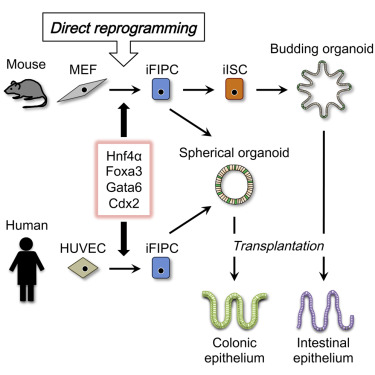当前位置:
X-MOL 学术
›
Cell Stem Cell
›
论文详情
Our official English website, www.x-mol.net, welcomes your feedback! (Note: you will need to create a separate account there.)
Generation of Mouse and Human Organoid-Forming Intestinal Progenitor Cells by Direct Lineage Reprogramming.
Cell Stem Cell ( IF 23.9 ) Pub Date : 2017-10-05 , DOI: 10.1016/j.stem.2017.08.020 Shizuka Miura , Atsushi Suzuki
Cell Stem Cell ( IF 23.9 ) Pub Date : 2017-10-05 , DOI: 10.1016/j.stem.2017.08.020 Shizuka Miura , Atsushi Suzuki

|
Intestinal organoids hold great promise as a valuable tool for studying and treating intestinal diseases. The currently available sources of human intestinal organoids, tissue fragments or pluripotent stem cells, involve invasive procedures or complex differentiation protocols, respectively. Here, we show that a set of four transcription factors, Hnf4α, Foxa3, Gata6, and Cdx2, can directly reprogram mouse fibroblasts to acquire the identity of fetal intestine-derived progenitor cells (FIPCs). These induced FIPCs (iFIPCs) form spherical organoids that develop into adult-type budding organoids containing cells with intestinal stem cell properties. The resulting stem cells produce all intestinal epithelial cell lineages and undergo self-renewing cell divisions. After transplantation, the induced spherical and budding organoids can reconstitute colonic and intestinal epithelia, respectively. The same combination of four defined transcription factors can also induce human iFIPCs. This alternative approach for producing intestinal organoids may well facilitate application for disease analysis and therapy development.
中文翻译:

通过直接谱系重编程生成小鼠和人类形成类器官的肠道祖细胞。
肠道类器官很有望成为研究和治疗肠道疾病的宝贵工具。当前人类肠道类器官,组织碎片或多能干细胞的来源分别涉及侵入性程序或复杂的分化方案。在这里,我们显示了一组四个转录因子Hnf4α,Foxa3,Gata6和Cdx2,可以直接对小鼠成纤维细胞进行重新编程,以获取胎儿肠源祖细胞(FIPC)的身份。这些诱导的FIPC(iFIPC)形成球形类器官,这些类器官发展成成年型的萌芽类器官,其中含有具有肠道干细胞特性的细胞。产生的干细胞产生所有肠上皮细胞谱系并经历自我更新的细胞分裂。移植后 诱导的球形和出芽的类器官可以分别重构结肠和肠上皮。四个定义的转录因子的相同组合也可以诱导人iFIPC。这种产生肠道类器官的替代方法可以很好地促进疾病分析和治疗开发的应用。
更新日期:2017-09-21
中文翻译:

通过直接谱系重编程生成小鼠和人类形成类器官的肠道祖细胞。
肠道类器官很有望成为研究和治疗肠道疾病的宝贵工具。当前人类肠道类器官,组织碎片或多能干细胞的来源分别涉及侵入性程序或复杂的分化方案。在这里,我们显示了一组四个转录因子Hnf4α,Foxa3,Gata6和Cdx2,可以直接对小鼠成纤维细胞进行重新编程,以获取胎儿肠源祖细胞(FIPC)的身份。这些诱导的FIPC(iFIPC)形成球形类器官,这些类器官发展成成年型的萌芽类器官,其中含有具有肠道干细胞特性的细胞。产生的干细胞产生所有肠上皮细胞谱系并经历自我更新的细胞分裂。移植后 诱导的球形和出芽的类器官可以分别重构结肠和肠上皮。四个定义的转录因子的相同组合也可以诱导人iFIPC。这种产生肠道类器官的替代方法可以很好地促进疾病分析和治疗开发的应用。


























 京公网安备 11010802027423号
京公网安备 11010802027423号